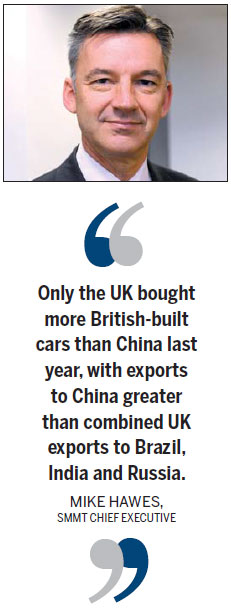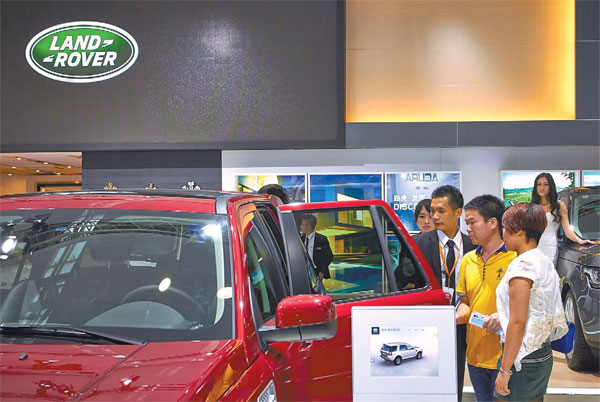Asian markets jumpstart UK car industry
Updated: 2015-04-17 07:02
By Zhang Chunyan(China Daily Europe)
|
|||||||||||
Business is booming for British brands after years of decline
Almost exactly 10 years ago the British carmaker MG Rover went bankrupt. The event seemed to mark the end of the once proud British automotive industry.
Having experienced ups and downs in the past decade, the car business is booming again in the United Kingdom.
|
Jaguar Land Rover on display at an auto show in China. A total of 122,010 of the company's vehicles were sold in the China region last year. Photos provided to China Daily |

The UK exported just under 1.2 million cars to more than 100 countries in 2014 and the automotive sector now has a greater share of UK exports than ever at 11.2 percent, according to figures from the Society of Motor Manufacturers and Traders.
China is the largest single market for British-built cars after the UK. The association's figures show that exports of cars to China have increased seven-fold since 2009.
"A total of 137,410 UK-built cars were exported to China in 2014, an increase of 14.5 percent from 2013," says Mike Hawes, SMMT chief executive.
"Only the UK bought more British-built cars than China last year, with exports to China greater than combined UK exports to Brazil, India and Russia."
He believes that economic growth in China, and a number of Asian markets, has led to increased demand for high-quality and luxury vehicles.
For example, Jaguar Land Rover, a leading UK manufacturer of luxury vehicles, sold a total of 122,010 vehicles in the China region in 2014, up 28 percent. China is its biggest and fastest-growing single market.
Last year, JLR inaugurated its first overseas factory in Changshu, Jiangsu province, near Shanghai. The factory is co-owned by China's Chery Automobile and is scheduled to go into full production in 2016.

The trend for UK cars in China reflects substantial growth in the wider Asian market, with the number of UK-built cars exported to Asia having more than trebled in five years. In 2014, the UK exported 220,682 cars to the region, compared with 60,804 in 2009.
Hawes says: "A desire for high-quality, premium vehicles with a strong brand heritage has placed the UK in a prime position to take advantage of this emerging market."
Significant investment in brands - such as Aston Martin, Bentley, Jaguar Land Rover, McLaren and Rolls Royce - mean that 60 percent of all UK-built models on offer in Asian markets are from premium manufacturers.
SMMT says the automotive sector was worth 26.2 billion pounds ($38.9 billion; 36.7 billion euros) in 2014.
In terms of manufacturing, Britain ranks third for European car production, behind Germany and Spain.
More importantly, says Hawes, the British government is now supporting the UK car manufacturing industry.
He says the British car industry had its glory days back in the 1960s and 1970s. From the 1980s it was characterized as unproductive, poorly managed and with difficult labor relations. There were low levels of quality, innovation and automation.
A shift away from British brands to German, French and Japanese ones also hastened the decline of the UK car industry.
In 1972, when British auto manufacturing was at its peak, 1.92 million cars rolled off production lines. That figure declined to about 1.6 million in the years preceding Rover's failure, diving to below a million as the financial crash struck.
From 2009, as a result of the recession, the British government realized there was a need to support manufacturing and created an organization solely for the automotive sector, to help attract investment and encourage young people to go into engineering.
"Over the last five years, things have really begun to turn around. Car volumes are increasing and the level of investment is increasing. We expect to make more cars in the UK than we ever have before," Hawes says.
Foreign investment has also helped to revive the UK car industry.
Car manufacturer Shanghai Automotive Investment Company took over British brand MG Rover after it went bankrupt in 2005. Now its newest SUV is expected to go on sale in China soon.
In 2008, India's Tata Motors paid Ford 1.3 billion pounds for Jaguar Land Rover.
Geely, the Chinese car manufacturer, bought the London Taxi Company in 2013 after it went into bankruptcy administration. In March, Geely announced it was investing 250 million pounds to build a new facility for the London Taxi Company in Coventry.
In addition to generating a turnover of 64 billion pounds, with 12 billion pounds of added value, the industry also directly employs 160,000 people and a total of 770,000 across the wider sector, according to SMMT.
With the number of Chinese car firms growing, so too is the quality and design of Chinese vehicles. The London Taxi Company benefited from a Chinese company's support and investment, says Hawes.
Chinese brands want to become international, but they need to increase their technical development and invest more in research and development.
"There is potential between R&D expertise and individual companies, and there's a need in the industry to innovate around safety, emission, technology and connectivity. A huge amount of money has to be spent," Hawes says.
Ning Hui contributed to this story.
zhangchunyan@chinadaily.com.cn
( China Daily European Weekly 04/17/2015 page22)
Today's Top News
Russia willing to restore relations with Kiev: Putin
Asian markets jumpstart UK car industry
Smog magnifies staffing woes for EU firms
Silk Road initiatives to connect people's hearts
AIIB to operate in 'transparent way'
PLA to buy advanced missiles from Russia
EU accuses Google of hurting consumers, competitors
Q1 economic data: what the economists say
Hot Topics
Lunar probe , China growth forecasts, Emission rules get tougher, China seen through 'colored lens', International board,
Editor's Picks

|

|

|

|

|

|







